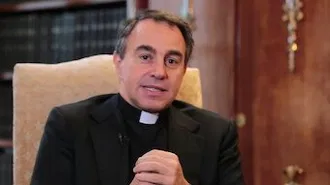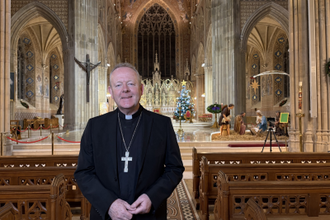Holy See issues new statement on nuclear weapons

Archbishop Ettore Balestrero. Image ACN
Source: Pax Christi USA
On Tuesday, 23 July 2024, Archbishop Ettore Balestrero, the Holy See's nuncio to the United Nations in Geneva, offered the following statement, at the Second Preparatory Committee of the 2026 Review Conference of the Treaty on the Non-Proliferation of Nuclear Weapons.
.
Mr Chair,
At the outset, my Delegation wishes to congratulate you on your appointment and to thank you for the consultations that you have conducted in preparation for this important gathering.
The Holy See is deeply concerned about the existential threat that nuclear proliferation and nuclear weapons continue to pose. This threat is further exacerbated by the tense strategic environment and the ongoing modernization and expansion of nuclear arsenals, which render the practice of nuclear deterrence less stable and increasingly worrisome. It is imperative to recognize that nuclear arsenals, as instruments of military strategy, inherently bear active disposition for use.
Pope Francis has recently reaffirmed the "immorality of manufacturing and possessing nuclear weapons"1. It is a matter of concern that there is a continuing growth in military expenditure related to nuclear weapons and that there is an increase in rhetoric and threats about their possible use, including low-yield tactical weapons. Such threats are an affront to humanity as a whole, as a nuclear war would undoubtedly result in an irreparable and devastating impact, with unparalleled loss of human lives.
In this regard, the ongoing armed conflicts, especially the war in Ukraine, serve as a stark reminder that the search for dialogue must be relentless and that he possession of "nuclear arms and other weapons of mass destruction represent a multiplier of risk that offers only an illusion of peace"2.
Mr Chair,
The Holy See would like to contribute to this meeting by proposing three areas for reflection:
1) Non-proliferation and disarmament, in addition to being legal obligations, are ethical responsibilities towards all members of the human family. During his visit to the Atomic Bomb Hypocenter Park in Nagasaki, Pope Francis asserted that "Peace and international stability are incompatible with attempts to build upon the fear of mutual destruction or the threat of total annihilation. They can be achieved only on the basis of a global ethic of solidarity and cooperation in the service of a future shaped by interdependence and shared responsibility in the whole human family of today and tomorrow"3.
2) In light of the prevailing tensions and of the catastrophic humanitarian consequences that would be inflicted upon humanity from the use of nuclear weapons, it is urgent to resume sincere dialogue with a view to establishing binding limitations on all nuclear weapons and delivery systems on a global scale.
In this regard, the Holy See calls upon all nuclear weapons States to engage in negotiations with a view to reducing their stockpiles in accordance with their obligations under Art. VI. Inaction, combined with the ongoing expansion and modernization of nuclear arsenals, has the potential to increase the risks associated with proliferation.
The advancement of delivery systems and cybertechnologies has further complicate the risks posed by the possession of nuclear weapons, including towards inadvertent escalation. Such advancements (e.g. hypersonic platforms, evasive trajectories and submarine drones) result in the reduction in decision-making and response times and thereby increase the likelihood of nuclear use. The introduction of cybertechnologies into nuclear command, control, and communications systems, early warning systems and launch systems renders these systems vulnerable. This becomes particularly worrisome when autonomous components are integrated into nuclear weapons systems.4
3) There are enormous costs associated with nuclear weapons that affect the global common good. For example the human and financial resources that are currently being allocated to modernisation efforts could be redirected towards development projects that address the urgent and universal needs affecting the poor and most vulnerable populations. In this regard, the Holy See reiterates its long-time proposal to establish a global fund, financed with portions of the money otherwise spent on weapons and other military expenditures. This fund would aim to eradicate hunger and promote development in the most impoverished countries5, thus contributing to the realization of a culture of life and of peace.
Mr Chair,
Against this bleak background, the Holy See wishes to reiterate its firm conviction that a world free of nuclear weapons is both possible and necessary. The Holy See also encourages further exploration of how the NPT and the Treaty on the Prohibition of Nuclear Weapons can be mutually reinforcing, including in the areas of nuclear disarmament verification, environmental rehabilitation, and assistance to victims.
To sustain a world without nuclear weapons, rigorous verification and compliance measures are needed, requiring sincere cooperation among all members of the human family. In this regard, the Holy See wishes to stress the valuable role of the International Partnership for Nuclear Disarmament Verification, which for the past decade has worked to identify technical challenges and possible solutions associated with verification in a collaborative spirit between nuclear and non-nuclear weapons States.
Mr Chair,
In the midst of the tragedy of ongoing armed conflicts, we must regain the awareness that we are members of one and the same human family. The laudable goals of non-proliferation and of disarmament enshrined in the NPT can only be achieved through its universal and honest implementation in letter and spirit.
Thank you, Mr Chair.
Notes
1. Pope Francis, Address to the diplomatic corps accredited to the Holy See, 8 January 2024.
2. Pope Francis, Letter to the Bishop of Hiroshima on the occasion of the G7 Summit, 19 May 2023.
3. Pope Francis, Address on Nuclear Weapons, Atomic Bomb Hypocenter Park, Nagasaki, 24 November 2019.
4. Cf. Position Paper of the Holy See "Treaty on the Non-proliferation of Nuclear Weapons: ethical dimensions and security challenges", submitted to the Tenth NPT Review Conference, 27 July 2022.
5 Cf. Pope Paul VI, Encyclical Letter Populorum Progressio, n. 51.


















